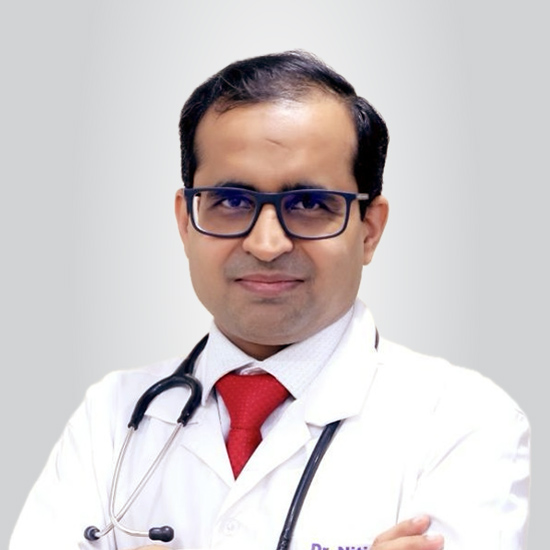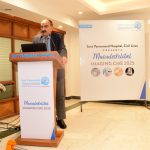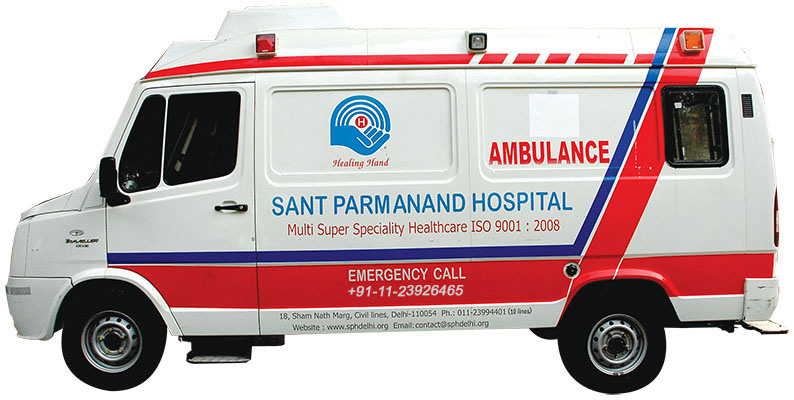Sant Parmanand Hospital, Civil Lines, is known for providing technologically advanced, compassionate care to patients who are suffering from a wide range of neurological disorders or mental health challenges. We are known as the best hospital for neurological problems in North Delhi NCR for a good reason. Not only do we offer the latest in diagnostic and treatment modalities, but we also provide personalised rehabilitation programs to ensure that our patients recover holistically.
Neurology is a part of medical science that focuses on diagnosing, treating, and managing disorders of the brain, spinal cord, and nervous system. As we know, the human nervous system is a complex network of nerves, that control all our actions- voluntary and involuntary.
Out nervous system transmits signals between the brain and body. This enables reasoning, movement, and physical perception.
If our nervous system is unhealthy because of disease, injury, or is degenerated, it can change how we live our lives. It is the complete understanding of this criticality that makes us the best hospital for neurological problems in North Delhi NCR.
The Importance of Early Diagnosis in Neurology
If neurological disorders are not diagnosed and treated in a timely manner, they can result in long-term disability or a poor quality of life. In case of an early intervention, not only can the patient better manage the disease, but also faces a significantly reduced risk of irreversible damage. Sant Parmanand Hospital has the best Neurologist for rTMS Treatment in Delhi and the best RTMS Specialist for Brain Stimulation in Delhi. Our experts are backed by our cutting-edge diagnostic facilities so that they have precise and prompt identification of neurological conditions. This allows them to design personalised treatment plans for each patient.
Common Neurological Disorders We Treat
Our hospital provides expert care for a wide spectrum of neurological conditions, including:
- Stroke (Paralysis): A medical emergency caused by the interruption of blood supply to the brain, resulting in paralysis and loss of function.
- Epilepsy (Fits, Seizures): A disorder characterized by recurrent seizures caused by abnormal electrical activity in the brain.
- Headache and Migraine: Chronic headaches and migraines that impact daily life and often indicate underlying neurological issues.
- Vertigo and Balance Disorders: Dizziness, imbalance, and disorientation caused by disturbances in the inner ear or brain.
- Parkinson’s Disease: A progressive neurodegenerative disorder affecting movement, causing tremors, stiffness, and difficulty with balance.
- Multiple Sclerosis (MS): An autoimmune disorder where the immune system attacks the protective covering of nerves, leading to nerve damage.
- Tremors and Ataxia: Involuntary shaking and lack of muscle coordination, often indicative of neurological impairment.
- Neuropathies and Neuralgias: Conditions affecting the peripheral nerves, causing pain, numbness, and weakness.
- Guillain-Barré Syndrome (GBS) and CIDP: Autoimmune disorders affecting the peripheral nervous system, leading to muscle weakness and paralysis.
- Bell’s Palsy: A condition causing sudden weakness or paralysis of facial muscles.
- Dementia (Memory and Behaviour Problems): Cognitive decline affecting memory, reasoning, and behaviour, often linked to Alzheimer’s disease.
- Meningitis and Encephalitis: Infections causing inflammation of the brain and spinal cord membranes, leading to severe complications.
- Muscle Diseases (Myopathy, Myositis, Muscular Dystrophies): Disorders causing weakness and degeneration of muscle tissue.
- Radiculopathy and Myelopathy (Spinal Disorders): Conditions affecting the spinal cord and nerve roots, causing pain, weakness, and numbness.
Symptoms of Neurological Conditions
Recognizing the early signs of neurological conditions is essential for timely diagnosis and treatment. Some common symptoms that may indicate an underlying neurological disorder include:
- Persistent or severe headaches
- Dizziness, vertigo, or loss of balance
- Numbness, tingling, or weakness in the limbs
- Memory loss, confusion, or difficulty concentrating
- Uncontrolled shaking, tremors, or muscle spasms
- Sudden vision or speech disturbances
- Seizures or blackouts
- Difficulty walking, coordination problems, or loss of motor control
- Chronic pain or abnormal sensations
If you experience any of these symptoms, it is advisable to seek immediate medical attention to prevent further complications.
Comprehensive Neurological Care at Sant Parmanand
Our Neurology Department has the best rTMS Specialist for Brain Stimulation in Delhi and rTMS Neurologist in Delhi NCR. The department offers comprehensive and customised neurological care, and it is led by Dr. Nitin Jain, a highly reputed neurologist with super-specialisation from India’s top institute. Under his guidance the department is committed to effectively diagnose, treat, and manage neurological disorders, with a wide range of services.
RTMS Therapy for Neurological Disorders
Repetitive Transcranial Magnetic Stimulation (rTMS) is a non-invasive, FDA-approved therapy used to treat neurological and psychiatric conditions. It involves applying electromagnetic pulses to specific regions of the brain to regulate abnormal neural activity. As the provider of the best RTMS treatment in Delhi, we deliver advanced, patient-centric care and are recognized as the top neurology hospital in North Delhi NCR.
- Applications of rTMS:
- Treatment-resistant depression
- Chronic pain syndromes
- Neuropathic pain
- Post-stroke rehabilitation
- Parkinson’s disease and movement disorders
- How It Works:
- Magnetic pulses stimulate targeted areas in the brain.
- Modulates neuronal activity to restore normal functioning.
- Safe and painless procedure with minimal side effects.
Diagnostic Services
Our Neurophysiology Lab is equipped with cutting-edge diagnostic tools to facilitate accurate diagnosis and monitoring of neurological conditions.
- EEG (Electroencephalogram): Measures brain electrical activity to diagnose epilepsy and other disorders.
- NCV (Nerve Conduction Velocity): Evaluates nerve function to identify neuropathies and nerve damage.
- EMG (Electromyography): Assesses muscle and nerve function for neuromuscular disorders.
- VEP (Visual Evoked Potential): Assesses visual pathway integrity to detect optic nerve dysfunction.
- BERA (Brainstem Auditory Evoked Response): Diagnoses hearing and brainstem abnormalities.
- SSEP (Somatosensory Evoked Potentials): Evaluates the sensory pathways of the nervous system.
- RNST (Repetitive Nerve Stimulation Test): Diagnoses neuromuscular junction disorders.
Neurotherapy and Rehabilitation Services
For patients with neurological disorders, we provide neurotherapy and specialised rehabilitation programs aimed at restoring function, increasing mobility, and improving quality of life. Our multidisciplinary team of occupational therapists, speech therapists, and physiotherapists creates personalised rehabilitation programs for each patient.
- Stroke Rehabilitation to regain motor functions and cognitive abilities.
- Speech and Language Therapy to address speech, swallowing, and communication issues.
- Physiotherapy for Neurological Disorders to improve balance, coordination, and strength.
Surgical Neurology
For complex neurological conditions that require surgical intervention, we have a team of highly skilled neurosurgeons who perform advanced procedures with precision.
- Brain Tumor Surgery
- Spinal Cord Decompression and Fusion
- Endoscopic and Minimally Invasive Neurosurgery
- Neurovascular Surgery for Aneurysms and AVMs
Benefits of Advanced Neurology Facilities and Technology
Our hospital is equipped with state-of-the-art facilities and cutting-edge technology to ensure accurate diagnosis and effective treatment of neurological conditions.
- 24/7 Emergency Neurological Care: Immediate intervention for critical cases such as stroke, seizures, and traumatic brain injuries.
- Advanced Imaging Facilities: High-resolution MRI and CT scans available round-the-clock to detect brain and spinal abnormalities.
- Neurophysiology Lab: Fully equipped with modern diagnostic tools to monitor and assess neurological function.
Why Choose Us for Neurological Care?
Choosing the right healthcare provider for neurological care can make a significant difference in treatment outcomes. Here’s why SPH Delhi stands out:
- Expert Leadership: Headed by Dr. Nitin Jain, a renowned neurologist with extensive experience and expertise.
- Multidisciplinary Approach: Collaboration between neurologists, neurosurgeons, rehabilitation specialists, and allied healthcare professionals.
- Personalized Treatment Plans: Tailored therapies and rehabilitation programs to meet individual patient needs.
- Advanced Diagnostic and Therapeutic Modalities: Ensuring precise diagnosis and targeted treatment.
- Round-the-Clock Emergency Care: 24/7 availability for handling critical neurological emergencies.
Our Dedicated Team of Neurology Experts
Our Neurology Department comprises a highly skilled team of:
- Neurologists: Specialists trained to diagnose and manage complex neurological conditions.
- Neurosurgeons: Experts in performing intricate brain and spinal surgeries.
- Physiotherapists and Rehabilitation Experts: Professionals dedicated to restoring mobility and function post-treatment.
- Neurophysiologists: Specialists in conducting diagnostic tests and monitoring neurological activity.
Our team works collaboratively to ensure that every patient receives the highest standard of care, from initial diagnosis to long-term management and rehabilitation.
Frequently Asked Questions (FAQ)
Which is the best hospital for neurological problems in Delhi?
Sant Parmanand Hospital, Delhi is known as the best hospital for neurological problems in North Delhi NCR. The hospital offers a wide range of services, modern technology, and expert medical care.
What is RTMS treatment, and how does it work?
Magnetic pulses are used in repetitive transcranial magnetic stimulation (rTMS) to activate particular brain regions. It is a non-invasive treatment for some neurological conditions, chronic pain, and depression.
Why Sant Parmanand is Trusted for the Best RTMS Treatment in Delhi ?
When it comes to non-invasive brain stimulation therapies, Sant Parmanand Hospital is widely regarded as the provider of the best RTMS treatment in Delhi. With highly skilled neurologists, advanced diagnostic technology, and RTMS protocols, patients receive the most effective and individualized care.
Is RTMS treatment safe and effective?
Yes, rTMS is FDA-approved, safe, and effective for many conditions, with minimal side effects and proven therapeutic benefits.
How do I know if I need to see a neurologist?
You should see a neurologist if you experience symptoms such as chronic headaches, seizures, numbness, dizziness, or memory loss.
What conditions can a neurologist treat?
A neurologist treats conditions like stroke, epilepsy, Parkinson’s disease, multiple sclerosis, neuropathies, and more.
Does Sant Parmanand Hospital offer 24/7 emergency neurological care?
Yes, we do. We provide 24/7 emergency care for critical neurological conditions, like strokes, seizures, and traumatic brain injuries.
How is a neurological patient treated at Sant Parmanand Hospital?
With customised treatment modalities, rehabilitation services, and continuous monitoring support to make sure that our patients recover comfortably.
What is the success rate of rTMS?
Depending on the condition being treated, the success rate of rTMS differs. However, significant improvements have been noticed in patients who were treated for depression, chronic pain, and certain neurological disorders.
Phone:- 011-23994401-10 lines ext.- 412 / 400 / 423 / 421
WhatsApp: – +91 8368999595
Email: – contact@sphdelhi.org























